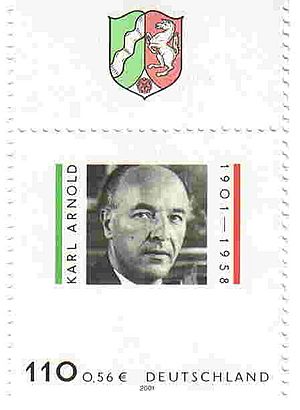Karl Arnold facts for kids
Karl Arnold was an important German politician. He was born on March 21, 1901, in Herrlishöfen and passed away on June 29, 1958, in Düsseldorf. From 1947 to 1956, he served as the Minister President of North Rhine-Westphalia, which is a state in Germany.
His Life and Work
After 1920, Karl Arnold worked full-time for Christian trade unions. These groups helped workers get fair treatment and better pay. In 1924, he became a secretary for the Christian trade union in Düsseldorf.
In 1928, Karl Arnold married Liesl Joeres. Their son, Gottfried, was born in 1933. Gottfried later became a member of the German parliament, called the Bundestag, from 1961 to 1983.
In 1933, Karl Arnold became a business partner in Düsseldorf. During the time of Nazi Germany, the secret police, known as the Gestapo, watched him closely. He was arrested after Count von Stauffenberg tried to stop Adolf Hitler on July 20, 1944.
After World War II, in 1945, Arnold helped start new industrial unions in the Rhineland with Hans Böckler. These unions later became part of the DGB, a big union group in Germany today.
He also got permission from the American Army to publish a daily newspaper called the Rheinische Post. His family still owns a part of this newspaper even now.
Karl Arnold died from a heart attack on June 29, 1958. This happened during a campaign for the state parliament elections. He was buried in Düsseldorf's South Cemetery.
His Political Journey
In 1920, Karl Arnold joined the Centre party. This was a political party in Germany.
After World War II, in 1945, Arnold helped create the Christian Democratic party in Düsseldorf. This party later joined with others to form the CDU. The CDU is one of Germany's main political parties. From 1956 until he died, Arnold was the CDU's deputy federal chairman.
Important Roles He Held
From 1925 to 1933, Karl Arnold was a member of the city council in Düsseldorf. He also led the Centre Party group there.
He was a member of the Landtag, which is the state parliament of North Rhine-Westphalia, from 1946 until his death. Between 1947 and 1949, he was also part of the parliament for the Bizone. This was a special area formed by the British and American occupation zones in Germany after the war.
In 1957, Arnold was elected to the Bundestag, Germany's national parliament. He received a very high number of votes in his area. He also served as the deputy chairman for the CDU/CSU group in the parliament.
On January 29, 1946, the American Military Government made Karl Arnold the mayor of Düsseldorf. He was then elected mayor in the first free elections held on October 26, 1946.
From December 1946 until 1956, he was the Minister President of North Rhine-Westphalia. This is like being the head of government for that state.
From September 7, 1949, to September 6, 1950, he was the first President of the Bundesrat. The Bundesrat is a council where representatives from Germany's states work together.
Because of this role, for a few days in September 1949, he was the Acting President of Germany. This was until Theodor Heuss was officially elected as the Federal President.
Karl Arnold lost a special vote in parliament on February 20, 1956. This meant he had to step down as Minister President. Fritz Steinhoff took his place.
Arnold died just one week before the next state elections in 1958. He was 57 years old.
See also
 In Spanish: Karl Arnold (político) para niños
In Spanish: Karl Arnold (político) para niños
 | Claudette Colvin |
 | Myrlie Evers-Williams |
 | Alberta Odell Jones |


